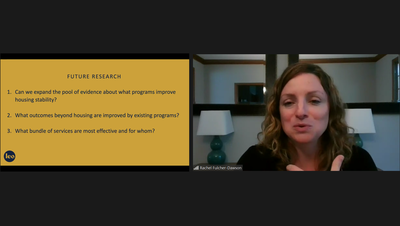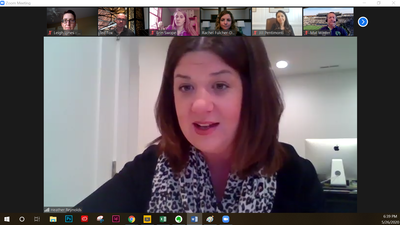On a late spring evening, LEO’s Managing Director Heather Reynolds and Head of Research Operations Rachel Fulcher-Dawson discussed with 40 people around the country—from their living rooms, bedrooms, and even closets, in the case of moderator Ted Fox—how LEO is fighting for more effective solutions to poverty during the University of Notre Dame's Research Uncorked. The May 26 event--typically held monthly at Ironhand Wine Bar in South Bend--was held via Zoom to comply with coronavirus social distancing practices.
The discussion centered around LEO’s research on homelessness prevention and how COVID-19 is exacerbating such problems. As Fulcher-Dawson said, this is a critical time for the poor.
"The challenges that COVID has brought to light have already existed,” she said. “We know people in poverty are more vulnerable to any kind of disruption—whether it's economic or the unraveling of social support systems. We know some big things about what works in housing and homelessness policy, but there is still a lot we don’t know. And there are a lot of people at risk of homelessness right now. This is central to LEO's mission: we need to know more about what programs work.”
Reynolds shared the good news—data prior to COVID-19 shows that homelessness has been on the decline in the United States. There are some obvious exceptions to this where cost of living is extremely high such as New York City and the west coast. However, this overall decline is partly due to the amount of evidenced-based studies on homelessness prevention and intervention that have influenced public policy.
Through research, LEO has found that preventing homelessness is a cheaper and more effective way to decrease homelessness rates. One specific homelessness prevention program stands out.
The Homelessness Prevention Call Center run by Catholic Charities Chicago and All Chicago provides emergency one-time funding to struggling individuals and families for housing-related needs. Unfortunately, funding is not available every day. LEO compared the outcomes of people who called on days when funding was available to the outcomes of people who called on days when funding was not available. In this way, LEO discovered that callers who received funding were 76% less likely to end up in a shelter. The funding also had long-term impacts: A year after calling, those who received assistance were significantly less likely to have fallen homeless. Individuals who received funding were also 55% less likely to be arrested for a violent crime, proving that these programs can have effects beyond just housing stability.
“This study really demonstrates that for people at risk of homelessness, emergency assistance can actually have long-term impacts as well,” Fulcher-Dawson said.

She further explained that LEO expanded the study to look at the other effects beyond housing that the call center has on individuals. LEO found the call center had other important societal impacts such as on criminal justice costs.
This intersection of various LEO research focuses shows how important it is for organizations to have evidence that their programs work for those they serve.
“We give interventions to people [in poverty] across our nation that aren’t backed by evidence that they work. For us at LEO, we believe strongly that families in poverty deserve more,” Reynolds said.
And this has been LEO’s goal since its founding in 2012 according to Reynolds.
“Unfortunately too often, the research [LEO’s founders] were doing as economists was going into wonderful journal publications, but then just sitting there.” Reynolds said. “Their idea became ‘How do we take what we’re learning and discovering in our economic research and make it research that serves, research that advances the common good?' That gave birth to LEO.”

LEO is looking forward to launching new projects in multiple areas such as criminal justice, foster care, and community college success with the hope that their findings will lead to more evidence-based public policy.
Reynolds said, “Our role is to be a voice for the voiceless in our nation who don’t have the power to say, 'No, we deserve poverty interventions that are backed by research and evidence.' So at LEO, when we learn that something works, we share it so it can be implemented elsewhere."